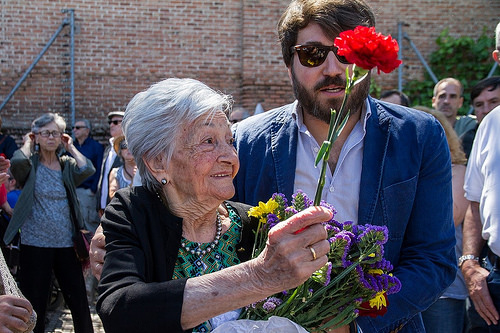Justice in Spain: Court-Ordered Exhumation of Franco Victim Succeeds
Almost eighty years after he disappeared, Ascención Mendieta could finally give a proper burial to her father, murdered by the Franco regime.
“This should never happen again,” 91-year old Ascención Mendieta said when she could finally rebury her father’s remains this past July 2, fulfilling a promise she had made to her mother many years ago. Timoteo Mendieta headed up the local socialist union in his small town near Guadalajara. He had been arrested in November 1939, shortly after Franco’s victory in the Spanish Civil War, when Ascención was only 13. Convicted of treason, he was shot and buried in a mass grave along with 27 others. He left a family with seven children.
Ascención Mendieta is one of the family members of victims of Franco’s repression who brought her case to the Argentine judge María Servini in 2010, after exhausting all judicial possibilities for reparation in Spain. Invoking the principle of universal jurisdiction, Servini took the case and ordered the exhumation of Timoteo Mendieta’s body. It was the Association for the Recovery of Historical Memory (ARMH), recipient of the 2015 ALBA/Puffin Award for Human Rights Activism, which undertook the arduous task of locating the body and disinterment. An initial exhumation attempt in January 2016 failed to find Mendieta’s remains. But a second attempt in June was successful. A DNA test brought final confirmation.
Ascención Mendieta brought her case to an Argentine judge in 2010.
The conservative Spanish government has refused to finance the ARMH’s work, which is consequently only possible thanks to the support of volunteers and organizations such as ALBA and the Puffin Foundation. Since Spanish journalist Emilio Silva created the ARMH in 2000, the Association and similar groups, assisted by the Basque forensic anthropologist Francisco Etxeberría, have opened more than 600 graves and recovered close to 8,000 victims. Yet the Mendieta exhumation is the first to take place in Spain at the orders of a court. Unlike other nations with histories of dictatorship, Spain’s transition to democracy included amnesty laws that covered all judicial accountability for political crimes committed since 1936. Not one regime official has ever faced trial and many of Franco’s victims remain buried in roadside ditches and other unmarked graves. An attempt by Judge Baltasar Garzón to investigate the bloody acts of repression by the Franco regime as crimes against humanity—which, under international law, would not be susceptible to amnesty—led to the judge’s disbarment in 2012.
The reburial in July attracted massive attention from the media and drew a crowd of thousands. The coffin was draped in a Spanish Republican flag. Those present reminded the journalists that many Spanish families still await their chance to locate and rebury their loved ones.
Sebastiaan Faber teaches at Oberlin College.














Finally. I hope all the families will find closure one day.
Our memory will resist.
beautiful story…closure, finally…